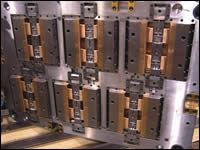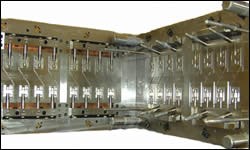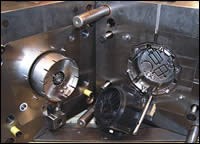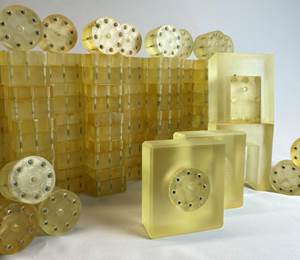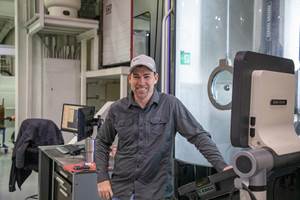Prodigy Mold & Tool: Taking Things One Step at a Time
Drive and determination results in a decade of success for this small moldmaker specializing in multi-cavity precision molds.
A little over a decade ago, Shawn McGrew and Darrin Schmitt—moldmakers working together at the same company—had a dream of running their own shop. Throwing caution to the wind, they joined forces and started Prodigy Mold & Tool, Inc. (Haubstadt, IN) in McGrew’s garage. Today, they have overcome many obstacles including foreign competition and a depressed economy to specialize in producing multi-cavity precision molds for a variety of industries—including medical, automotive, electronics and consumer goods—utilizing a combination of high-speed machining, advanced engineering and unattended machining strategies to stay ahead of the competition.
Today, Prodigy Mold has 10 dedicated employees that McGrew and Schmitt credit with helping the company survive—and thrive—during difficult times. The company’s offerings include mold design and build, 3-D part design, engineering changes and repair work in addition to a good deal of component work for other shops with its high speed milling and sinker EDM capabilities. Fortunately the company has kept very busy, recently completing more than $500,000 of work in a 14-week period. Schmitt notes, “We had nine molds get released in a very short period of time plus the usual ECs and repair. We had to sub a little work out, but not much. We really focused on keeping things flowing through the shop and utilizing unattended machining. It’s really amazing what can be accomplished when you focus and concentrate on it. During this time we bought our second Roeders, knowing we would have to have it in order to complete the jobs on time.”
Determination and Drive
In spring of 1996, McGrew and Schmitt opened Prodigy’s doors. “We had a few basic machines and a lot of determination,” McGrew recalls. “Through the years, we slowly and steadily built our business—adding new equipment and employees along the way. In the summer of 1999, we constructed a new building and things were rolling along fine.”
Toward the end of 2000, McGrew and Schmitt began to notice a downturn in its business. “That slowdown ultimately turned the moldmaking trade upside down,” McGrew states. “The real struggle had begun. There were many times we scratched our heads and wondered what we were doing and how much longer we could go on. We both felt we had too much invested in the business that we could never recover, so we decided to dig our heels in and give it our best effort. And that is exactly what we did.” Schmitt adds, “Although we don’t have a strategic marketing plan we do a lot of networking with other shops that has opened up doors for us; and also are a preferred vendor for many of the companies we work for—making it easier to obtain new work.”
Over the past five years, Prodigy invested heavily in high-speed and hard milling technology, which McGrew notes gave the company a definite edge on its competition. “The economic climate was very uncertain at the time, but we knew we needed this technology after seeing the advantages firsthand after visiting a shop in Wisconsin that was leading its own push on high-speed hard milling,” McGrew comments. “We were very uncomfortable spending that much money not knowing for sure when our next jobs would come, but at the same time we knew that our survival was on the line. We made the decision to buy a Roeders high-speed mill and have never looked back.” Schmitt adds, “It was really a matter of necessity. We believed—and continue to believe—that in order to stay in this business you must keep up with new technology to stay on the cutting edge. Roeders had the highest rpm spindle and fastest feedrates of the machines we considered. After seeing the machine perform, we felt very comfortable with it.”
The company’s EDMs also were a large investment for the company. A Charmilles Roboform 30 with an integrated robot that has a 90-electrode and four-pallet capacity gave Prodigy Mold a huge advantage by allowing them to run lights out.
Schmitt notes, “We also have some of the best moldmaking software (Cimatron) that is great for designing molds in solids and then, to a large degree, automates the electrode making process. All of our programming is also done with Cimatron making it very efficient since there is no data translation we need to do.
Small But Strong Workforce
McGrew and Schmitt are full of praise for their employees’ fierce loyalty. “They are perhaps one of the finest group of employees around,” McGrew states. “I just can’t say enough about their dedication and willingness to change as the moldmaking trade continues to evolve. If you don’t have people who are willing to accept change and evolve along the way, you are going to have some serious problems down the road." Schmitt also notes that they all work very well together and communicate to accomplish the task at hand. “Good open communication leads to a more informal, relaxed environment, which I feel is more conducive to learning and also allows our employees to evaluate new ideas and express their opinions which they may not otherwise do in a formal setting,” he notes.
The duo finds qualified employees typically through word-of-mouth from people they know and trust. Fortunately, turnaround is low. “We are constantly presenting and trying new ideas amongst ourselves on the shop floor, which in turn helps everyone evolve in how we do things,” McGrew states. “We encourage our team members to think outside the box—if they have an idea that makes sense, we try it and determine whether it saves time and money. Processes and procedures are continually under scrutiny in order to eliminate waste, which is defined by anything that does not add value and is not necessary for the mold to function properly. We also keep on top of the latest technologies primarily through trade magazines and occasional trade shows.
“As far as keeping our employees happy, we try to offer a super-ior working environment with the most up-to-date equipment,” McGrew adds. “We also give out an annual bonus, which is based on each person’s performance and our overall profit margin for the year.”
Overcoming Adversity
Schmitt acknowledges one of the duo’s biggest challenges has been transitioning from a moldmaker to a business owner. “Neither one of us had any business or personnel management training before we started this business. There are so many things you have to have in place—legal issues, tax and accounting issues, how to handle several team members and how to deal with customers and vendors. A lot of what we’ve learned has been learned the hard way. You make mistakes and hopefully learn from it and go on. Making some ‘non-fatal’ mistakes can be a good thing if you learn from it. Knowing how to deal with and communicate with people is one of the most important aspects of being successful. I would encourage anyone wanting to start a business to read, read and read all kinds of personal improvement, sales, finance and general business tomes.”
McGrew adds that rising healthcare costs and taxes are a concern as they want to take care of their employees as best they can. “Just last year we set up an HSA (Health Savings Account), which puts more responsibility on individuals to make wise health care choices,” he comments. “Hopefully this will change the way Americans think about healthcare and make things better for everyone in the long run.”
In addition, dealing with payment terms has put the company to the test. “In many cases the moldmaker is now expected to finance the tool build all the way until PPAP, which can be an indefinite amount of time (thank you automotive industry,)” Schmitt notes. “We work with our customers as much as we can with them on this issue knowing that they don’t get paid either until they are producing good parts. In turn, we also expect our customers to work with us when they can. There has to be some give and take. Verbal contracts aren’t worth the breath it takes to utter them and written contracts aren’t worth much more than that if we don’t pursue it when they get breached. If we were to pursue them what kind of relationship does that tell us we have with our customer? Whenever we feel that a customer is not being fair and not being up front with us, we have no choice but to focus more on the good customers we have or new customers that appear to have better potential and quit doing work for customers that aren’t paying, that’s really the only leverage or recourse we have.”
Dreams Come True
Despite the challenges Prodigy has faced, McGrew and Schmitt are not ready to give up their dream. “We will continue to build the business with a main focus on technology and automation,” McGrew notes. “We are planning to add space to the shop later this year as well as add in-house mold sampling capabilities in the near future.”
Schmitt echoes these sentiments, adding, “Attending IMTS this fall will give us an idea what equipment will be the most beneficial to increasing our productivity. Our goal is not to be the biggest shop with the most debt, but instead to take things one step at a time. This has proven to be a successful strategy for us.”
Related Content
In "Hybrid" FIM Process, 3D Printing Complements Injection Molding
Alpine Advanced Materials used a desktop 3D printer and the freeform injection molding process to reduce prototype tooling production time and cost for its customers.
Read MoreHow to Achieve Unmatched Accuracy in Very Large Workpieces
Dynamic Tool Corp. purchases two bridge-style double-column CNCs to increase the cutting envelope and maintain 5-micron cutting accuracy in the long term.
Read MoreSpeed, Productivity Gains and High Uptime Ease Decision for Second Five-Axis Machine
Byrne Tool + Design reduced setups and gained speed and productivity thanks to fast, accurate and compact five-axis CNC machining centers.
Read MoreCT Scanning Helps Micro Molder Reduce Cost of First Article Inspections
CT scanning services performed by 3D ProScan, a division of NyproMold Inc. provides MTD Micro Molding with accurate, high-resolution internal and external measurements performed about seven times faster and at significant cost savings.
Read MoreRead Next
Are You a Moldmaker Considering 3D Printing? Consider the 3D Printing Workshop at NPE2024
Presentations will cover 3D printing for mold tooling, material innovation, product development, bridge production and full-scale, high-volume additive manufacturing.
Read MoreHow to Use Continuing Education to Remain Competitive in Moldmaking
Continued training helps moldmakers make tooling decisions and properly use the latest cutting tool to efficiently machine high-quality molds.
Read MoreReasons to Use Fiber Lasers for Mold Cleaning
Fiber lasers offer a simplicity, speed, control and portability, minimizing mold cleaning risks.
Read More



